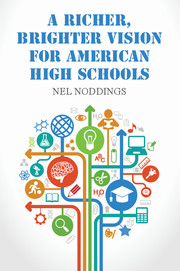Book contents
- Frontmatter
- Contents
- Introduction
- 1 Unity of Purpose
- 2 Vocational Programs
- 3 What Might Have Been: Women's Traditional Interests
- 4 A Better Adult: Continuing the Search
- 5 Parenting
- 6 The Common Core Standards
- 7 Critical Thinking
- 8 Collegiality, Caring, and Continuity
- 9 The Curriculum and Its Setting
- 10 Planning, Enacting, Evaluating
- 11 The Professional Preparation of Teachers
- 12 Reflecting on the Brighter Vision
- Notes
- Bibliography
- Index
11 - The Professional Preparation of Teachers
Published online by Cambridge University Press: 05 June 2015
- Frontmatter
- Contents
- Introduction
- 1 Unity of Purpose
- 2 Vocational Programs
- 3 What Might Have Been: Women's Traditional Interests
- 4 A Better Adult: Continuing the Search
- 5 Parenting
- 6 The Common Core Standards
- 7 Critical Thinking
- 8 Collegiality, Caring, and Continuity
- 9 The Curriculum and Its Setting
- 10 Planning, Enacting, Evaluating
- 11 The Professional Preparation of Teachers
- 12 Reflecting on the Brighter Vision
- Notes
- Bibliography
- Index
Summary
Teachers in the United States have long struggled for professional status. In this chapter, we will revisit some of the history of that struggle and try to identify both promising recommendations and discouraging mistakes that were made in that effort. Then, working from the chapters preceding this one, we will explore what a strong secondary-teacher education program should look like. In that section, we will consider both the major subject to be taught and the subject matter of education more widely construed. In the last sections, we will consider how teachers can be prepared to define and sustain the ethos of their schools and how that work and their daily interaction with students might contribute to a more genuinely moral civic society.
THE STRUGGLE FOR PROFESSIONAL STATUS
Formal teacher training began in the United States with the establishment of normal schools, the first of which appeared in Massachusetts under the urging of Horace Mann in 1839. It was obvious to Mann and other supporters of public education that well-trained teachers were needed if the public schools were to succeed and grow. As the school population grew, and especially when more children began to attend high school in the early twentieth century, the normal schools gave way to teachers colleges, and these schools began to offer college degrees. But although the degrees were bona fide BAs, some organizations – the American Association of University Women (AAUW), for example – refused to admit women whose degrees were earned at teachers colleges. The status problem persisted.
A huge change occurred at the end of World War II. Hordes of returning veterans, supported by the GI Bill, sought admission to higher education. The teachers colleges were ready to expand. They had subject-matter departments similar to those in liberal arts colleges and universities, and most of them were eager to welcome the influx of new students. Almost overnight the low-status teachers colleges became state colleges. Montclair State Teachers College, for example, became Montclair State College and, after several decades and the addition of specialized schools, Montclair State University.
- Type
- Chapter
- Information
- A Richer, Brighter Vision for American High Schools , pp. 158 - 174Publisher: Cambridge University PressPrint publication year: 2015



